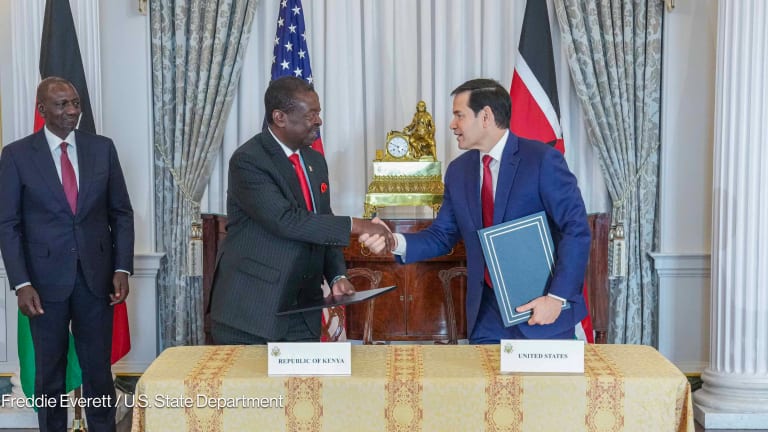A tug of war over Uganda's health workers
A country like Uganda, which has some of the world's worst health indicators, can ill afford to lose any trained staff. But the East African country is still planning to "export" doctors, nurses and midwives to Trinidad and Tobago — despite opposition from donors and health advocates.
The monthslong tug of war between Ugandan officials and health activists over a government agreement to export health workers continues, despite a court’s recent refusal to block the move. Advocates say the plan, which calls for the government to send 263 doctors, nurses and midwives to Trinidad and Tobago, constitutes a state-sanctioned “brain drain” of the health system that could reverse recent health system gains. They intend to ask the country’s constitutional court to decide that fulfilling the agreement violates Ugandan citizens’ implicit right to health. Government officials argue Uganda has health workers to spare. But in a country with some of the world’s worst health indicators, activists say the public medical system can ill afford to lose any trained staff. Development partners, worried their support for Uganda’s health system would effectively be used to benefit another country, have also signaled their displeasure with the plan. In March, the Belgian government suspended 11 million euros ($12.6 million) in direct aid that was intended for Uganda’s health sector. The government is now scrambling to modify the arrangement in the hopes of appeasing donors and partners without abandoning the agreement entirely. Low-paid, overworked health workers Justinian Kateera was working as a legal adviser in the Ministry of Foreign Affairs when he learned of Trinidad and Tobago’s request in April 2014. With some of the lowest salaries in the region, Ugandan doctors, nurses and midwives often seek better-paying jobs outside the country. But no government had ever asked their Ugandan counterparts to facilitate the process. Kateera lobbied against the request internally, “because I thought we were on very shaky policy and legal ground.” Uganda faces widespread health worker shortages. In 2010, the country reported one doctor for every 24,725 people, well below the World Health Organization’s recommended one physician per 1,000 people. In some rural parts of the country, there are no doctors at all. One result is that Uganda suffers one of the world’s worst maternal mortality ratios. According to WHO, for every 100,000 deliveries in 2013, 360 mothers died giving birth. Trinidad and Tobago has nearly 10 times as many physicians as Uganda. After a yearslong campaign, civil society activists convinced the government to recruit more than 7,000 new health workers starting last year. Though the numbers are not commensurate, by fulfilling Trinidad and Tobago’s request, Kateera warned Uganda would appear to be reversing itself and indicating it is not actually committed to improving access to health care. He found the timing — amid the Ebola outbreak in West Africa — especially galling. As the world realized one of the factors in facilitating the outbreak “was that we have just failed to invest sufficiently in the human resources for health,” Uganda was considering voluntarily depleting its ranks. But the ministry overlooked his objections and launched a recruitment process. When Kateera happened upon a shortlist of the top 283 applicants in October, he resigned his job. Two weeks later, from his new position as executive director of private think tank Institute of Public Policy Research, he asked the country’s high court to issue an interim injunction against the move until he could challenge the plan in constitutional court. No injunction despite risk of crippling health system Foreign affairs officials maintain Uganda actually has the health workers to spare. The country has 59,000 registered health professionals for 57,000 approved positions in the public health system. But only about 60 percent of those jobs are taken — in many cases, the ministry acknowledged, because government simply does not have the money to fill the empty spots. As a result, there are an estimated 21,000 health professionals out of work or working in the private sector who would be available to expatriate or assume jobs that become vacant. Except, activists charge, the Ministry of Foreign Affairs did not select from the ranks of the unemployed. Instead, the majority of the shortlisted health workers are currently in Uganda’s public health system. And nearly 50 of them are specialists — neurosurgeons, psychiatrists, pathologists — who will not easily be replaced if they go abroad. Rather than wade into these arguments, at the end of April the country’s high court decided to sidestep the issue entirely. As “a decision of the executive arm of government,” the presiding justice explained, the expatriation was “a political question which would ordinarily have nothing to do with the courts.” As a result, she could not grant an injunction. Kateera told Devex the ruling was “odd, it’s immoral, it’s contrary to public policy.” And the IPPR official warned there could be ramifications from donors and partners, who “suddenly realize that the health sector would be dead aid.” For donors, civil society, a ‘puzzling’ move Belgium’s March aid suspension indicates he is right to be concerned. Donors and other external funders are covering nearly 40 percent of Uganda’s health budget this fiscal year. While no other cuts have been announced, the country has come in for additional diplomatic criticism. As early as December last year, U.S. Ambassador Scott DeLisi told local media the move to export health workers was “puzzling.” “Of course, people out here, civil society and some development partners outrightly feel this is crazy,” said Dr. Vincent Oketcho, country director of IntraHealth International, though he cautioned that that might be an overreaction. The U.S.-funded project works with the Ministry of Health to identify gaps in the system and train workers. Nevertheless, anticipating government wariness of additional criticism, health activists have continued lobbying ambassadors and development partners to speak out against the expatriation plan. Nakibuuka Noor Musisi, an officer with the Center for Health, Human Rights and Development, a Ugandan nongovernmental organization, declined to say who exactly they have been talking to. “But you have seen a number of partners saying we are blocking funding to Uganda because of this,” she told Devex. “It’s not because they’re just reading. We write, we call them, we SMS.” ‘I’ve reached a point where I can no longer stay’ The one group activists know they do not have on their side in this battle is the health workers. Dr. Bongomin Bodo has been working as a pediatrician in northern Uganda for more than a decade. He moved there despite the presence of the Lord’s Resistance Army. Over its two-decade insurgency, its ranks swollen with abducted child soldiers, the LRA would force more than 2 million people from their homes and leave tens of thousands dead. Bodo found an incredibly volatile situation, where medical supplies rarely made it to his hospital. The LRA was driven out by 2006 and Bodo “hoped things would get better. Unfortunately that has not happened.” Nine years later he still faces regular shortages of drugs and basic supplies. The hospital infrastructure is falling apart. And despite more than a decade of service, he barely makes enough money to pay school fees for his only child. When a friend told him about the opportunity to go to Trinidad and Tobago, Bodo thought “maybe things would be a little bit better” and submitted an application. He made the shortlist. If he is selected, he will go, even though he knows he is unlikely to be replaced. Pediatricians are already in short supply, let alone pediatricians willing to work in northern Uganda. “I feel very proud having worked here all these years,” he said, but without a salary increase or improvements to the hospital, “I’ve reached a point where I can no longer stay.” IPPR’s Kateera does not fault Bodo. He understands that the recent health worker increase is not enough and the system needs additional improvements. Which is why he is hoping his petition to the constitutional court will force the government to confront the question of why health workers are so eager to leave Uganda. “We want the constitutional court to rule on the constitutionality of this particular proposal,” he said, “and also to go a little bit ahead to determine the question whether there is an actual right to health in Uganda” even though it’s not enshrined in the constitution. If the tribunal sides with the activists, they hope to use the ruling as leverage to compel the very improvements Bodo is requesting. Opportunity to ‘reform health care services significantly’ Unless it happens soon, it is likely at least some Ugandan health workers will end up in Trinidad and Tobago, IntraHealth’s Oketcho said. “Government is committed to make it work,” but they want to do it without further recrimination. Oketcho has been sitting in on sessions at the Ministry of Health, which is belatedly being integrated into the process, as officials strategize about how to move forward. They are poring over numbers to determine if there are fields where Uganda does have excess health workers that it could afford to send. They have also discussed asking Trinidad and Tobago to foot the cost of training replacement health workers. And they are consulting with medical associations and development partners along the way. However they decide to move forward, Oketcho said, they know “they’re going to have to demonstrate that it’s not going to be bad.” Even if he wins in court, Kateera accepts that he might still lose this battle. The government could, after all, just turn the process over to a private firm and rob him of his constitutional argument. But he is glad to have helped force a discussion of what donors, development partners and citizens expect from the Ugandan government when it comes to health care. “I think for the longest time, nationally, we’ve not had a really good debate around health care reform,” he said. “This is an opportunity for us to reform health care services significantly.” Check out more insights and analysis for global development leaders like you, and sign up as an Executive Member to receive the information you need for your organization to thrive.
The monthslong tug of war between Ugandan officials and health activists over a government agreement to export health workers continues, despite a court’s recent refusal to block the move.
Advocates say the plan, which calls for the government to send 263 doctors, nurses and midwives to Trinidad and Tobago, constitutes a state-sanctioned “brain drain” of the health system that could reverse recent health system gains. They intend to ask the country’s constitutional court to decide that fulfilling the agreement violates Ugandan citizens’ implicit right to health.
Government officials argue Uganda has health workers to spare. But in a country with some of the world’s worst health indicators, activists say the public medical system can ill afford to lose any trained staff.
This story is forDevex Promembers
Unlock this story now with a 15-day free trial of Devex Pro.
With a Devex Pro subscription you'll get access to deeper analysis and exclusive insights from our reporters and analysts.
Start my free trialRequest a group subscription Printing articles to share with others is a breach of our terms and conditions and copyright policy. Please use the sharing options on the left side of the article. Devex Pro members may share up to 10 articles per month using the Pro share tool ( ).
Andrew Green, a 2025 Alicia Patterson Fellow, works as a contributing reporter for Devex from Berlin.








